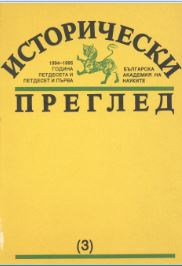Московското съглашение за примирие и преследванията в България на поданиците на Германия и нейните сателити
The Moskow Armistice and the Persecution in Bulgaria of the Subject of Germany and its Satellites
Author(s): Gospodinka NikovaSubject(s): History, Political history, Recent History (1900 till today), Special Historiographies:, WW II and following years (1940 - 1949), Fascism, Nazism and WW II
Published by: Институт за исторически изследвания - Българска академия на науките
Summary/Abstract: The Armistice signed in Moscow on October 28, 1944, burdened this country with a large number of grave terms. One of the first conditions was to intern the subjects of Germany and its satellites. This sanctions was imposed by the Allies so as to isolate the subjects of the hostile states for the duration of the military operations. The movable and immovable property of this category of foreign citizens was put under supervision, and later passed in the possession of the Soviet Union. Under the pressure of the Soviet representatives who in fact ran the Allied Control Commission (ACC) in Bulgaria, the scope of those interned was groundlessly expanded. The sanctions affected not only the subjects of Germany and Hungary but also of many other states, as well as Jews and Bulgarian citizens. Children and old people, mothers with babes in arm and expectant mothers were not spared either. Those interned were sent first to Pavel Banya and later for them was set up a special concentration camp in the “Zelen Dol” locality not far from Blagoevgrad. At the request of the ACC the internments continued also after the end of the military operations in Europe. The camp for foreigners was closed only in late December 1945. The Soviet Mission in Bulgaria applied also other punitive measures not envisaged in the Armistice. On its insistence part of the interned Hungarians and Germans were repatriated. General Biriuzov gave and ultimatum to mobilize and send to worki in the USSR all men (from 17 to 45 years of age) and women (from 18 to 30 years) of German descent. The “Labour Mobilization” included mainly Bulgarian citizens originating from mixed marriages. The Bulgarian Germans worked in extremely harsh conditions. Some of them died in Soviet camps and those who survived returned in groups to Bulgaria by the end of 1946. The majority of the repressed persons had nothing to do with politics and were even proven antifascists since the inveterate supporters of the Nazi regime had left the country already with the German troops. The Commissariat for the Implementation of the Armistice was responsible on the Bulgarian side for the internments, “labour mobilization” and repatriation. It was headed by Prof. Petko Stainov, Minister of Foreign Affairs and Denominations. As a defeated state, without a peace treaty signed yet, Bulgaria in point of fact had the, status of an occupied state. Any non-compliance with the orders of the ACC was interpreted as failure to observe the terms of the Armistice and complicated the forthcoming peace negotiations. In spite of that the Commissariat, headed by Prof. Stainov, tried in every way to oppose the Soviet diktat. It tried to restrict the repressions into the framework of the Armistice and to narrow as much as possible the range of those affected. Thanks to P. Stainov’s direct intercession thousands were saved from internment and hundreds of innocent people from “labour mobilization”. He had definite merits also for the relatively small number of those repatriated, as well as for the return from the Soviet Union of a larger number of the Germans.
Journal: Исторически преглед
- Issue Year: 1995
- Issue No: 3
- Page Range: 88-132
- Page Count: 45
- Language: Bulgarian
- Content File-PDF

